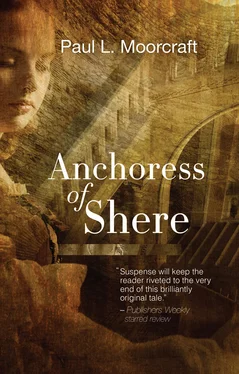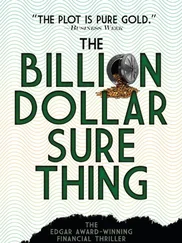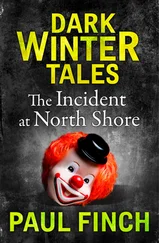Paul Moorcraft - The Anchoress of Shere
Здесь есть возможность читать онлайн «Paul Moorcraft - The Anchoress of Shere» весь текст электронной книги совершенно бесплатно (целиком полную версию без сокращений). В некоторых случаях можно слушать аудио, скачать через торрент в формате fb2 и присутствует краткое содержание. Жанр: Триллер, на английском языке. Описание произведения, (предисловие) а так же отзывы посетителей доступны на портале библиотеки ЛибКат.
- Название:The Anchoress of Shere
- Автор:
- Жанр:
- Год:неизвестен
- ISBN:нет данных
- Рейтинг книги:4 / 5. Голосов: 1
-
Избранное:Добавить в избранное
- Отзывы:
-
Ваша оценка:
- 80
- 1
- 2
- 3
- 4
- 5
The Anchoress of Shere: краткое содержание, описание и аннотация
Предлагаем к чтению аннотацию, описание, краткое содержание или предисловие (зависит от того, что написал сам автор книги «The Anchoress of Shere»). Если вы не нашли необходимую информацию о книге — напишите в комментариях, мы постараемся отыскать её.
The Anchoress of Shere — читать онлайн бесплатно полную книгу (весь текст) целиком
Ниже представлен текст книги, разбитый по страницам. Система сохранения места последней прочитанной страницы, позволяет с удобством читать онлайн бесплатно книгу «The Anchoress of Shere», без необходимости каждый раз заново искать на чём Вы остановились. Поставьте закладку, и сможете в любой момент перейти на страницу, на которой закончили чтение.
Интервал:
Закладка:
Mark looked downcast. “I’m supposed to leave on Friday.”
“Why don’t you catch your flight and I can contact you if I find out anything? If I may be frank, Mark, I do think you’re branding the wrong steer. Look, I know you’re desperate to find out anything you can about your sister, but don’t get fixated on a Catholic priest. They’ve got a reputation in Ireland for getting lonely parishioners knocked up, but I’ve never heard of them kidnapping or doing worse things to young women.”
“I’m sure you’re right, Irv, but he’s not Irish. Why do we always associate priests with being Irish?”
“Because it’s the jewel in the papal crown,” the American said in his classroom style. “The Emerald Isle is the most Catholic place on earth, and the Pope wants to keep it that way. No rubbers. No abortions. No porno mags or skin-flicks. It’s like feudalism, really; the state backs the Church in its primitive authoritarianism. The real Irish problem is that the brightest ones become priests and are generally celibate, whereas the Jewish problem is the cleverest ones become rabbis-and you know what large families they have. I can say that, by the way, because I’m a Catholic with Jewish relatives.”
“I didn’t know that professors could indulge in such racial stereotyping.”
“Sure, we do it all the time. The stereotyping of ideas is politics. Refining stereotypes is philosophy.”
“Sounds too philosophical for me, Irv. My view is that the clever Irish all emigrated to America; the thickos stayed behind to listen to the Pope and give us Brits a hard time over Northern Ireland.”
“Yes, you’re still in the army. You might be needed if things blow up in Ulster, unless we Americans can get you out of there first.” The professor smiled mischievously. “But we still need you in Germany. So go back. I have another month left of my sabbatical. You can leave some leaflets with me, and I’ll check with Constable McGregor at the Shere police station before I go. If I hear anything, I’ll phone you, I promise. Don’t wreck your military career on top of everything else.”
“Yes, you’re right. I’m making an ass of myself. We’ll have a farewell drink on Thursday, then I’ll bugger off to Woking before I get my flight from Heathrow. Thanks, Irv, I’m glad I got to know you. It’s been a bloody tough few months.”
XIV. The Fallen Woman
The previous months had been even tougher for Marda, but they had been a time of joy and peace compared with her suffering after Christmas Eve. She had ventured all when she had thrown herself at her captor; she had ended up degrading herself and risking her life. It was a conscious strategy, not a drunken whim, although the alcohol had made it a little easier. Realising that he was utterly repressed, she had hoped somehow to distract him, to find a way out, perhaps from the bathroom. She had prayed that someone might call. She knew more than enough about his character to realise that playing the sexual card to a psychotic misogynist was extremely dangerous, but she had wanted to create a smokescreen to confuse him while she sought a means of escape. She had not really planned to kill him; that had come to her in extremis , when her self-abasement into public nudity had forced her to accept the final option, to kill or be killed. Marda had fallen back on the last resort of a young female: sexual allure. And it had failed. He was more monster than man, she realised finally. She had gambled all and lost.
In one way she was relieved, because he hadn’t raped her nor, almost as bad, made love to her with her apparent consent. She didn’t know whether she could have gone through with it. If he was undressed and also off-guard, she had been fully prepared to bolt out of the house without any clothes on. That wouldn’t have mattered as long as she was out of the prison. The windows would have been closed, perhaps secured, and the doors certainly locked; yet it was an opportunity for freedom which she had lost.
For the first few hours she sat in her cell trying to keep warm with her blankets bound tightly around her. Her new dress and habit had been left in the kitchen. Luckily he had left her with some heating oil, and she managed to fill up the paraffin stove in the dark. She was careful not to spill any of the precious fluid. She had some warmth, maybe enough for six to eight hours, depending on how low she kept the flame, and she had half a bottle of water. She was full from her meal, but she had no extra food, so she tried to stop herself vomiting up the meal after the trauma of the evening; she needed that food inside her. Marda retched, but did not vomit. She tried to control her breathing; she swallowed some water, which helped. She knew he would starve her again, although she tried not to think of what else he would do. The least was that he would probably sulk for a few days, but she would survive somehow. Eventually, she would find a way of escaping, even if it meant killing him.
Had he realised, somehow, somewhere in his subconscious, that she was edging him towards the knife? She was terrified of this because sometimes she thought he could read her mind.
For two days she sat in the dark. She rationed her cigarettes to one every four hours, or what she guessed was four hours. She did the same with her water and heat. The light was off so she lived inside her mind. What else could she do? Either submit totally to the life he wanted her to lead, some crazed notion of being a hermit, or defy him completely. She had endured so much, but she felt her mind was still robust, although she knew she was not strong enough to overcome him physically-even if she could catch him unawares. If she had reached the knife, could she have plunged it into his back? After two days in the cold and dark she knew the answer was “yes.” She thought of the morality of being a murderer, too, but she would have killed in self-defence, under massive provocation. He did it to innocent people because he was deranged. She asked herself yet again if she was descending into the depths of insanity, and she wondered what had made him so crazy. Or was he always like that? Was he born mad, had he suffered some tragedy? Or had religion turned his brain?
She hummed the anthem of her times, “We shall overcome,” to herself; “Yes, I will survive, at any cost,” she kept saying to herself. She would keep up her mental and physical strength, and she would find a loophole in his defence. Then she would kill him if she had to. But what if he just left her to rot? No matter what, she would try once more to be friendly and interesting to him, but first he had to come down to the cellar.
She always knew when he was in the house because she would hear the bath water running every few hours.
On the third day, she was frantic with cold and hunger. She tried banging on the door, but she knew that the sound did not carry up through the stone floor, nor through the thick wooden cellar door. She would have to wait for him, or death.
On the fourth day, eventually, he came with bread and water. In a weak voice she managed some questions and apologies, but he said nothing. Four or five hours later he came back with coffee and oil for the heater, but he refused to respond to her at all. The coffee was grittier than usual, and the taste was a little more tart; she had learned that he was a creature of habit, so she wondered why he had changed his brand.
She was sleeping badly but she felt very tired, and thought that she might get a good night’s-or was it day’s-sleep. Just as she nodded off, there was a slight tap on the door. It woke her up, and she said, “Come in.”
The tapping continued for a while, and she shouted more loudly for Duval to enter. The door opened slowly, and she saw a thin arm, carrying a candle, move timidly around the edge of the door.
Читать дальшеИнтервал:
Закладка:
Похожие книги на «The Anchoress of Shere»
Представляем Вашему вниманию похожие книги на «The Anchoress of Shere» списком для выбора. Мы отобрали схожую по названию и смыслу литературу в надежде предоставить читателям больше вариантов отыскать новые, интересные, ещё непрочитанные произведения.
Обсуждение, отзывы о книге «The Anchoress of Shere» и просто собственные мнения читателей. Оставьте ваши комментарии, напишите, что Вы думаете о произведении, его смысле или главных героях. Укажите что конкретно понравилось, а что нет, и почему Вы так считаете.












